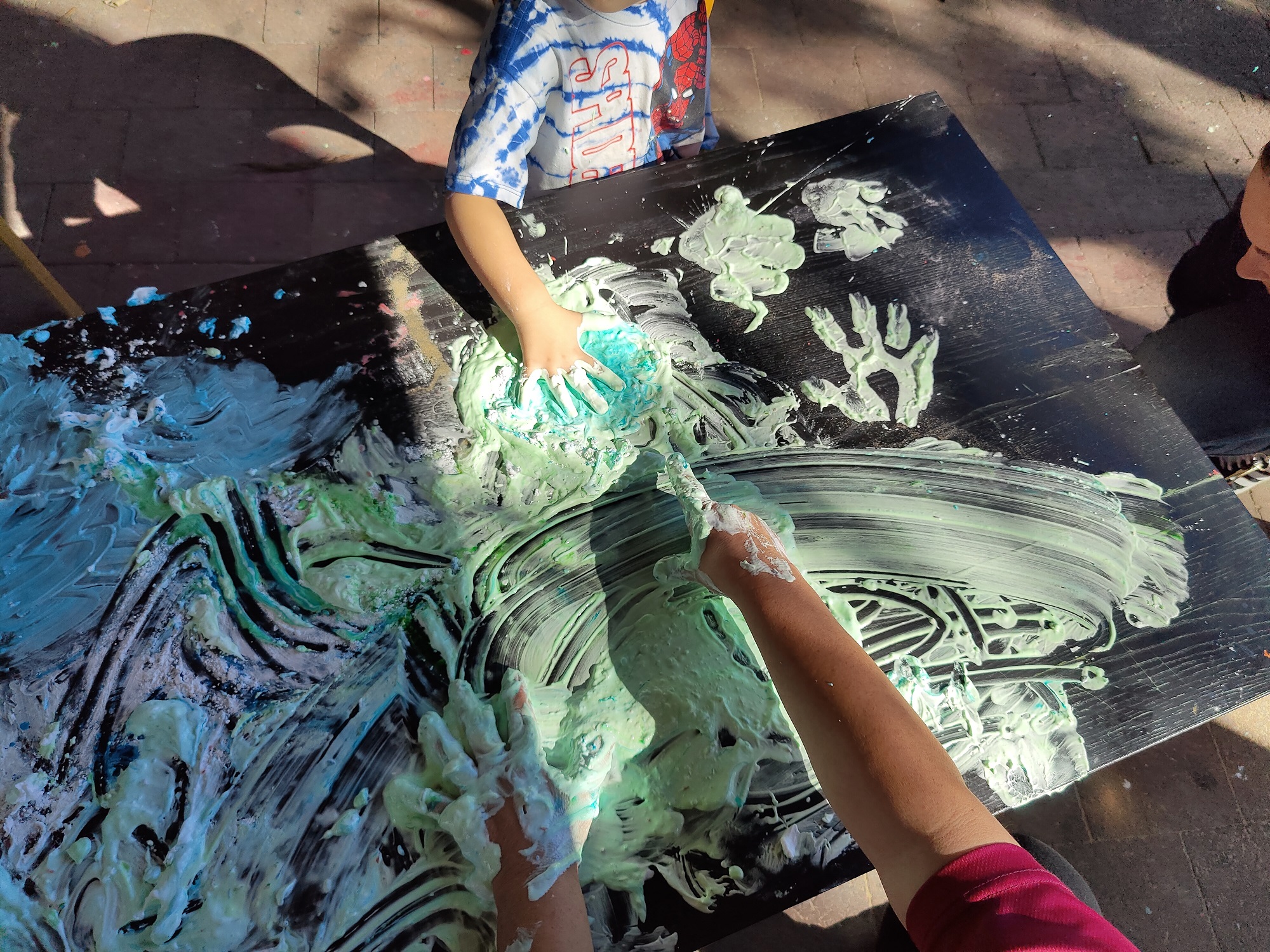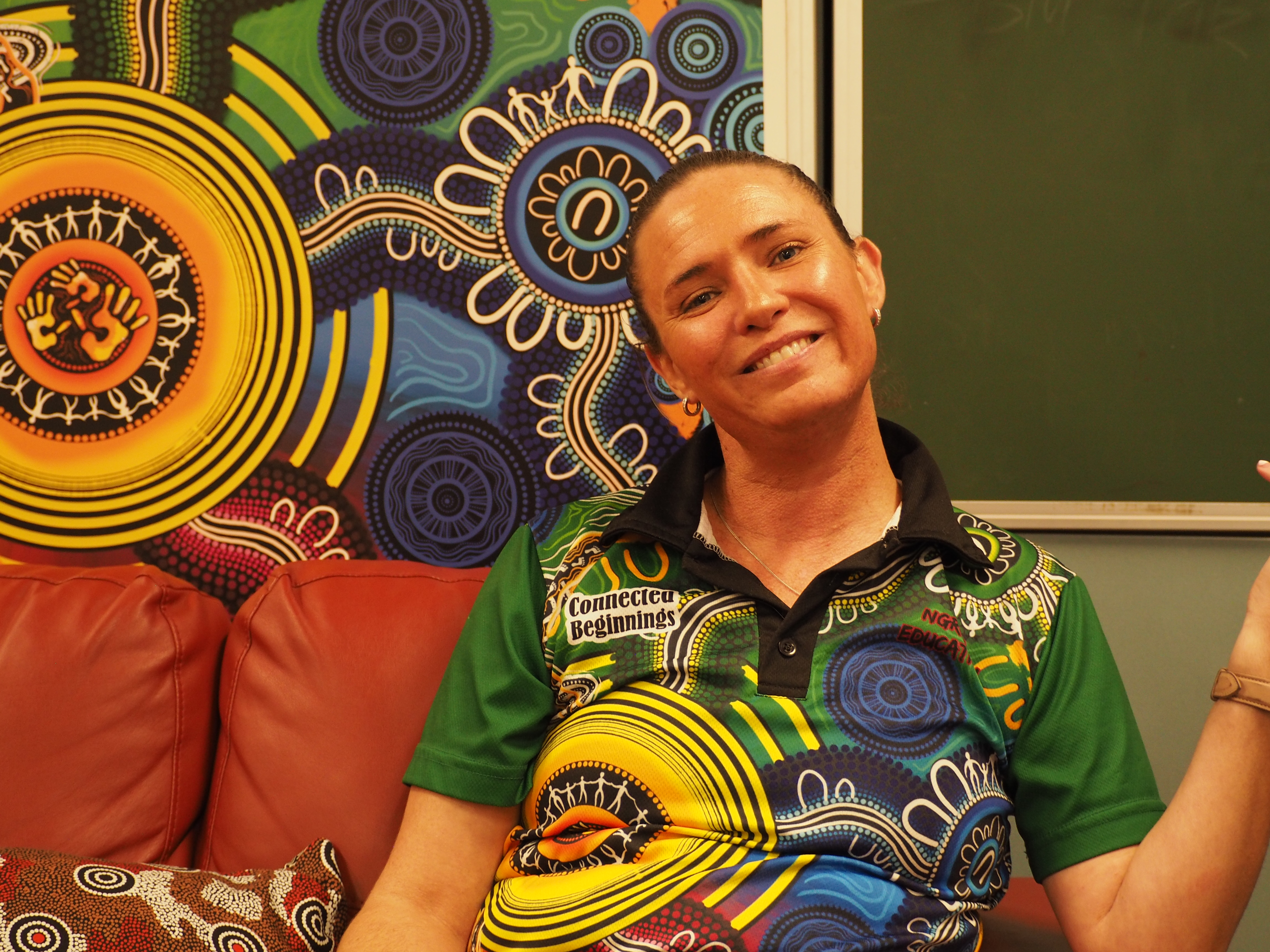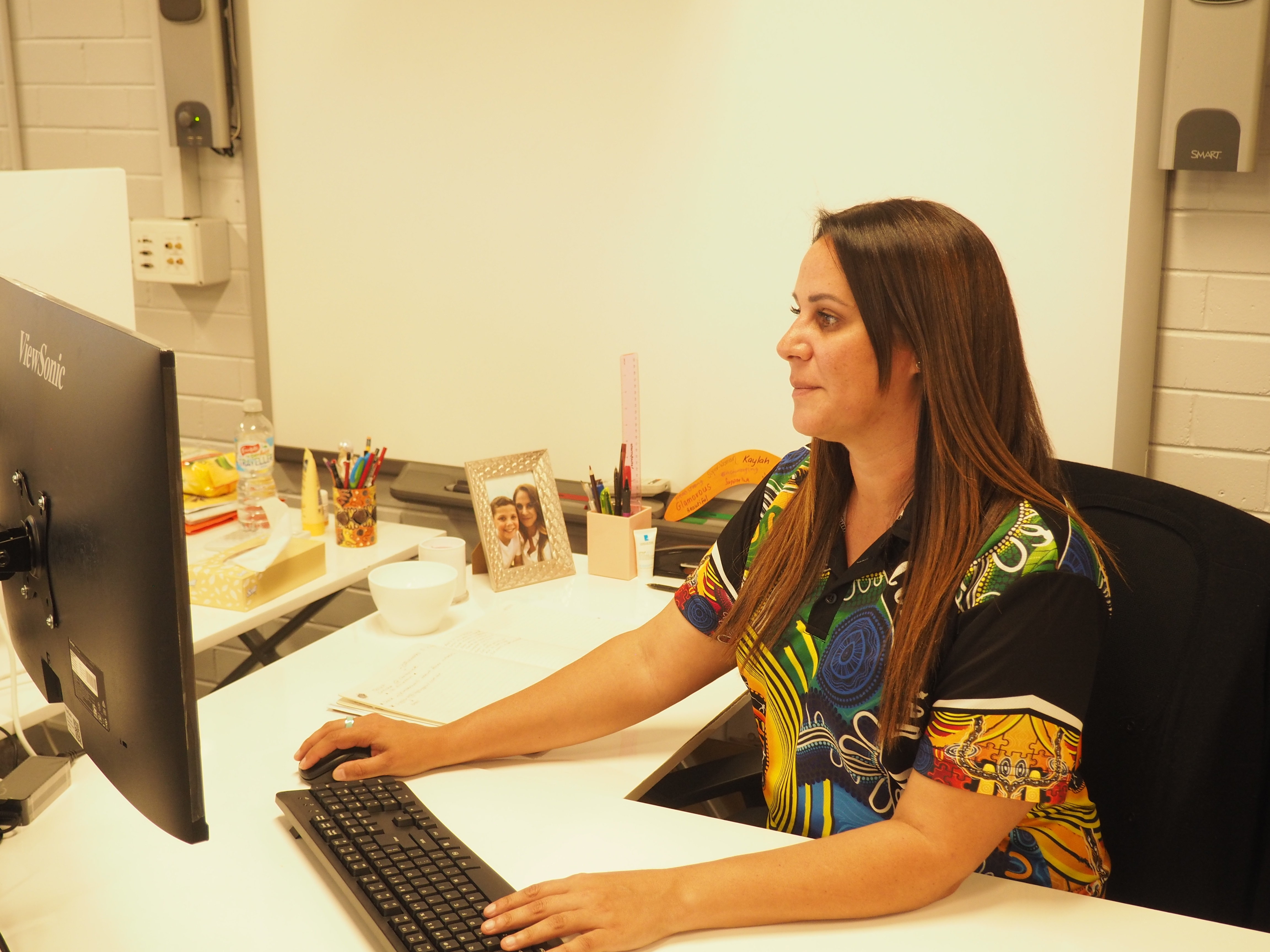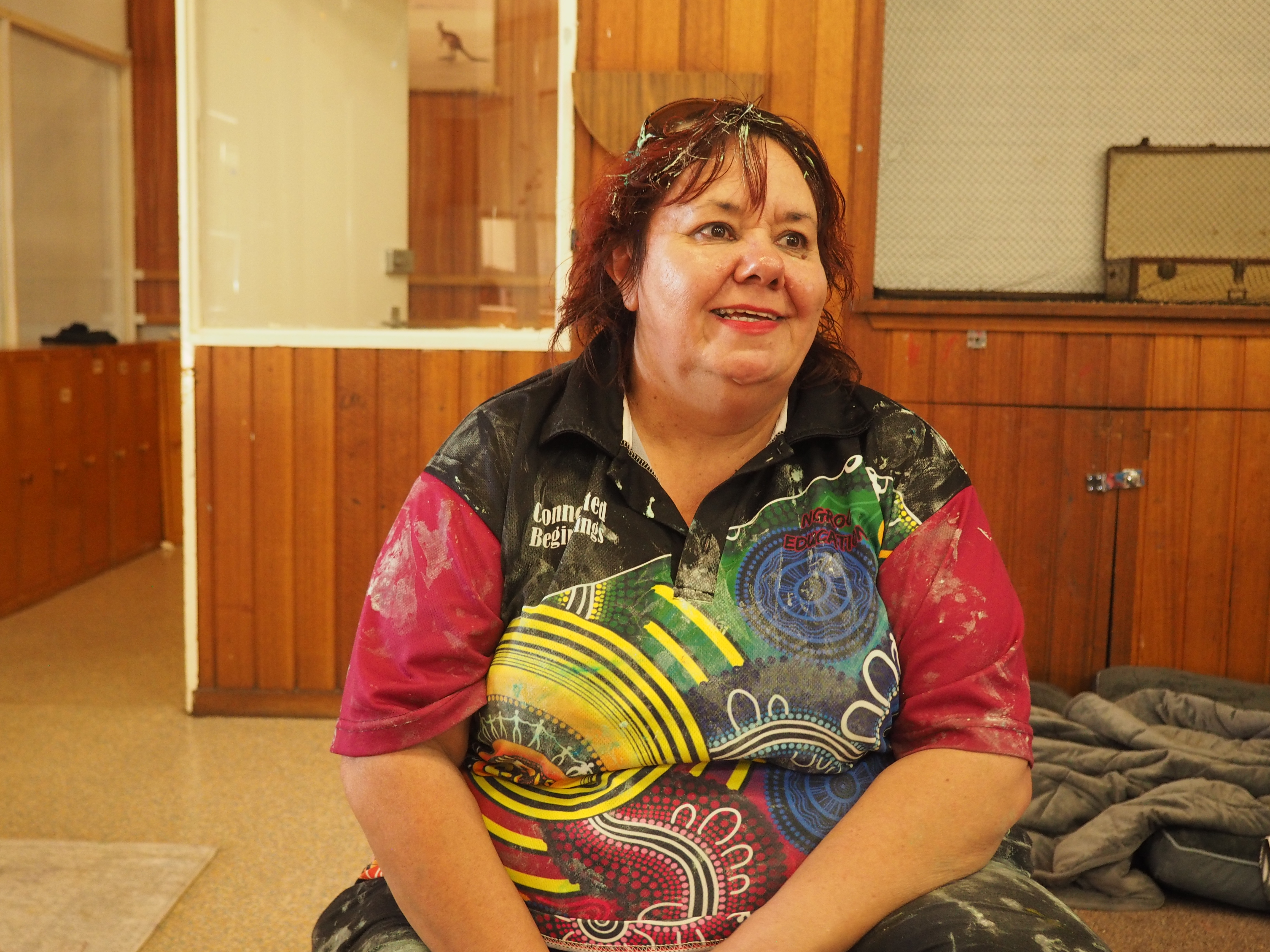Stronger local communities by linking support services through playgroups.
On this page:
On a sunny afternoon on Dharug country in western Sydney, tiny figures follow Joanne Horton. A proud Yuwaalaraay woman, Joanne heads to a table in the yard at the Murray-Toola Damana preschool. Anticipation rises as she lays out her kit — bags of corn flour, multi-coloured rice sprinkles, containers of water.
Now, everyone in the middle. Start! Start mixing!
Oh, look! That’s unicorn rainbow juice. I had to chase a unicorn to get that juice, so mix it well, please. We’ve gotta make one big, giant pie.
I found a green frog who gave me some frog juice. Where do I get blue juice? What has blue juice?
(Lemonade!)
I found some lemonade and some blue juice. Can you put some blue with the green and let's see what will happen?
Look, you can make patterns. Can you draw pictures in there?
What's green? A frog? An alien? I'm bringing all my alien juice to you. Can you see where my alien was walking?
All right, are you ready? We're gonna do rice rain. Ready? Look at the rainbow colour!
Everyone directly involved or nearby is soon wearing evidence of the fun.

Messy play at Murray-Toola Damana preschool on Dharug Country, western Sydney.
But this activity is not just about keeping young children occupied for an afternoon — it is a path for building networks of support for the community.
The playgroup at Murray-Toola Damana (Dharug for ‘many hands’) is a Connected Beginnings site in western Sydney managed by the Ngroo Education Aboriginal Corporation. The area covered by Ngroo has a large First Nations population, more than 23,000 people, of whom more than 50% are under the age of 24. Many have cultural ties originating elsewhere in the state or country as the result of past resettlement practices.
Connected Beginnings is a national Closing the Gap measure that brings together First Nations community members and organisations to find local solutions collectively. It draws upon the strength and knowledge of Aboriginal and Torres Strait Islander communities to help ensure children are safe, healthy, and ready to thrive at school by the age of 5.
Jointly funded by the Department of Education and the Department of Health and Aged Care, the Connected Beginnings program supports families to access for themselves, local early childhood education and health and care services.
Krystle Daley, a proud Wiradjuri woman, is the executive director of Ngroo, based in Tregear. She coordinates the Connected Beginnings partnerships across the suburbs of Doonside and Mt Druitt. Krystle joined Ngroo in 2020 after a career in child protection and early intervention elsewhere in NSW.
I'm very strong in my Lore. I am not from this area. So I thought if I hired the right people from this area, it would be easier for us to deliver a service and to get relationships built the right way.

Krystle Daley, executive director of Ngroo
At that time, the Connected Beginnings program in Mt Druitt had only one worker. Krystle’s immediate priority was to add staff and to meet the local community, including elders.
We went out to listen to our mob and get feedback where gaps are, and how we can deliver a service for our people.
From building local relationships we started consultations with other services. From our first meeting with 10 services, we ended up with 25. We're all holding ourselves accountable.
We have had massive success stories. We have prevented kids from being removed purely because the families wouldn't engage with a service, purely because those had no Aboriginal staff.And now others, like DCJ [NSW Department of Community and Justice], come to us asking for support.
Krystle says the next step was to establish an early childhood education and care service with a First Nations focus — one that the local community recognises as culturally safe and supportive.
We saw that there were no Aboriginal playgroups, at all, in Mt Druitt 2770. So we now run pop-up playgroups in partnership with [the nearby Aboriginal preschool] Murray-Toola Damana.
Families come along to the playgroup and they get a preview of what preschool is like. They feel comfortable and they feel welcome. Last year, we went in one month from 4 families to 15 after the word got out. Now we have 20 families that come along.
Kaylah Graham, a proud Kamilaroi woman who is Ngroo’s executive programs manager, explains that families who join an early childhood education and care program can then see support options provided by other community services.

Kaylah Graham, executive programs manager at Ngroo
In May we had our first ever Aboriginal and Torres Strait islander early learning expo, with 7 preschools and child care centres from our local area. As well as stalls with information for parents on how to enrol their children, there were activities for kids — face painting, balloon twisting, popcorn.
We also had Births, Deaths and Marriages, Services Australia, Northcott early childhood NDIS, Hearing Australia. All with info that parents might need, readily available on the day.
You build the trust, you can link them in. If you can see how kids are interacting, you can tell if one is not having a great day. It's just so important to know when they're in survival mode, and so they're not going to be able to take things in and learn.
One measure of success is the increased demand for support services. Jo Everingham works with Ngroo’s partner Connect Children and Families, an organisation providing family support services across a wide area of western Sydney.
For our work in Mt Druitt, it's just been a fantastic opportunity to work with an organisation that is really embedded within community.
We run a lot of transition to school programs, for 4 to 5 years and some for 5 to 12 years. So we see families and can identify issues — internal stresses, the developmental needs of the child. Issues that are out of their control. I'm able to ring the team here to workshop through what's needed and then offer referral support.
I think there's definitely a need for culturally safe support. They have an amazing team here. They are able to work within a way that ensures the family is supported in their journey as parents, but also with no judgement.
All of that then carries across their own community by word of mouth: ‘I know where you can get some support. They did this for us. It's worked for us.’
When not leading messy play at Murray-Toola Damana, Joanne Horton works directly with families in their homes under the state’s Aboriginal Families as Teachers program. This focuses on families with children aged zero to 5 and uses approaches that centre on Aboriginal culture and ways of being.

Joanne Horton
Play-based learning, says Joanne, awakens an appetite for learning among young children.
They're not in the proximal age for learning higher levels until they're 6 or 7. In the meantime, we bring them in, we play, we do all the fun stuff.
You can give them a little bit of guidance, but there's also a lot of teaching in that — colours, textures, smells. A hands-on experience. So when we send them off to school they're eager to be learners.
Kids have no voices, kids have no choices. But it's important for the community to recognise that kids do tell us everything, we just have to listen for it. And that's through their play. They can't use words to describe themselves, they can use their actions. We as adults need to learn to watch and observe to know what they're trying to tell us.
Watching the hands-on fun at Murray-Toola Damana playgroup, but from a safe distance, was Kelly Smith. She works with Yellow Door, Mission Australia’s early intervention mental health program for ages zero to 18. It offers self-referral or recommendation by family or school.
I know Jo from a previous role. I can go to a home visit with Jo. She's a familiar face with that family, then they get to know me. I can talk about all the services that we can provide and then that family can decide whether they want to take up support from Yellow Door.
There is still a lot of shame about accessing services. A lot of people still fear mandatory reporting by services, and things like that. We do know that for families in trauma having a consistent, positive relationship with somebody during treatment is so beneficial.
And potentially there are benefits for other service providers in relationships that they can develop across the board.
One discovery to emerge from the community consultations is the long waiting list for speech therapy. Krystle applied for funding from the philanthropic Cages Foundation, which supports First Nations communities, to develop a speech therapy program. Fifteen families have accessed the free program since it began in October 2022.
Meanwhile, a partnership with Hearing Australia is helping to diagnose hearing disorders among local preschoolers. Testing held at the Kimberwalli Aboriginal centre is followed by referrals to specialists and support for the families as necessary.
With this outreach Ngroo is collating a lot of information. To manage the data in line with community expectations, Krystle’s Connected Beginnings team has partnered with Just Reinvest — a coalition of more than 20 organisations.
These stories belong to our people. This information, and the stats, and how they feel — this is their journey.
We will be forming a governance committee from local Aboriginal community members. Everything that we collect will be owned by the Mt Druitt Aboriginal community.
We believe in sovereignty of data, we're 100% behind it.
